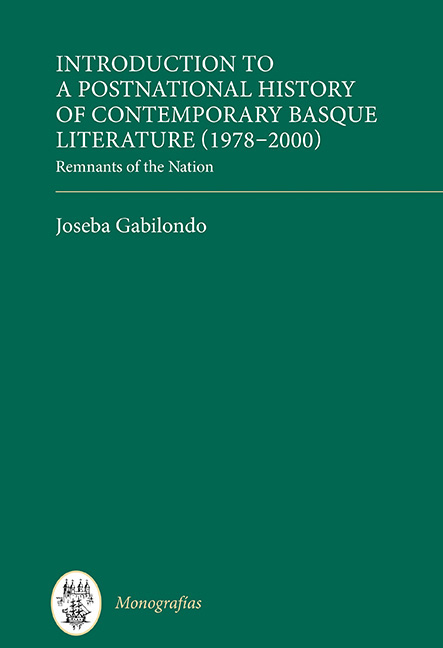 Introduction to a Postnational History of Contemporary Basque Literature (1978–2000)
Introduction to a Postnational History of Contemporary Basque Literature (1978–2000) Book contents
Preface and Notes on the Translation
Published online by Cambridge University Press: 06 September 2019
Summary
I am publishing the English translation of Nazioaren hondarrak (Remnants of the Nation; new title Introduction to a Postnational History of Contemporary Basque Literature (1978–2000)), which appeared originally in 2006 in Basque, for two reasons. First, the scarcity of literary studies on Basque literature published in English continues to be a severe problem for the dissemination and expansion of knowledge on Basque literature. Second, most Basque criticism represents the continuation of an old–fashioned positivist philological and sociological tradition, even when dressed in more contemporary terminology, and, consequently, it is not very receptive to the wealth of literary and theoretical production generated by what loosely has been grouped as ‘(poststructuralist) critical theory’ in North America, the UK, and France.
As several critics acknowledge, Remnants of the Nation was an innovative anomaly when it was published and, therefore, it remains valuable as the first work to bring poststructuralist theory to Basque literary criticism. Moreover, the book advances a theory, postnationalism, in order to approach contemporary Basque literature and culture, which still remains central to many debates, historical and literary. This is the reason why the articles collected here retain their critical pertinence, despite the fact that they were written between 1993 and 2000. Most articles were published in English in scholarly journals and books, following a rigorous critical and theoretical style; yet, some of them, written in Basque in more traditional cultural journals, required a less formal style and approach in order not to alienate the Basque reader of that time. Therefore, this book contains a variety of styles and approaches that its international ideal readership – Basque continental, North American, and global – will understand. The introductory section, ‘Postnational Theory and History’, was written originally for the book; I have also added a new epilogue, which summarizes the development of Basque literature(s) since the year 2000.
Furthermore, after Remnants of the Nation, I also published another work in 2013: New York–Martutene: Euskal postnazionalismoaren utopiaz eta globalizazio neoliberalaren krisiaz (New York–Martutene: On Basque Postnationalist Utopia and the Crisis of Neoliberal Globalization (English publication in progress)). The book takes as a departure point the most important novel of what I call ‘the long Basque twentieth century’, Ramon Saizarbitoria's Martutene (2012), and endeavors to revisit the most recent Basque literature (2000–12). Thus, New York–Martutene takes up Basque literature where Remnants of the Nation left off: the year 2000.
- Type
- Chapter
- Information
- Introduction to a Postnational History of Contemporary Basque Literature (1978–2000)Remnants of the Nation, pp. vii - xiPublisher: Boydell & BrewerPrint publication year: 2019
